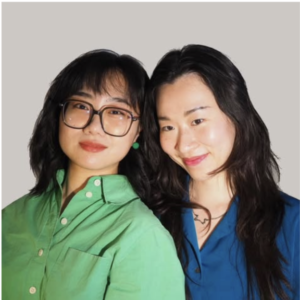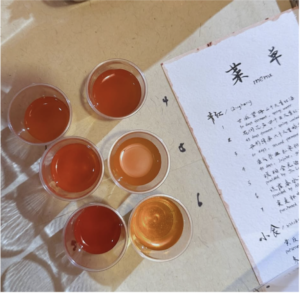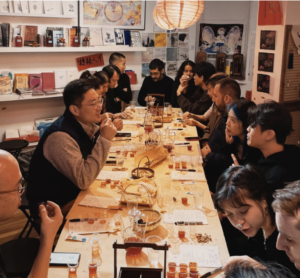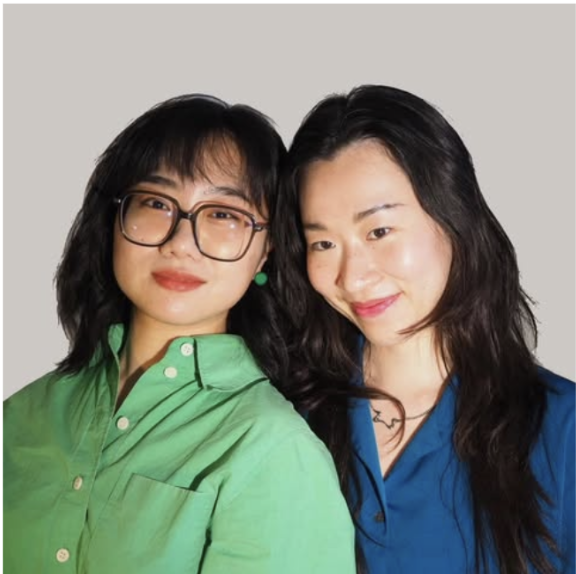In the bustling streets of New York City’s Chinese neighborhoods, two girls found themselves on a journey to reconnect with their heritage, going from store to store to learn the Fuzhou dialect from local shop owners.
The two childhood friends, Shuyu Fang, 28, and Qixin Zhang, 31, created the “Fuzhou Sisters” Instagram account in September 2023 to promote Fuzhou culture.

Fuzhounese immigrants make up one of the largest groups of Chinese immigrants in New York City, which reached a population of 500,000 ever since 2004. Following the 1980s, waves of immigrants from villages of Fuzhou, Fujian province have influxed neighborhoods in New York City, especially the street of East Broadway in Manhattan, which became known as “Little Fuzhou,” and Sunset Park in Brooklyn. Immigrants from Fuzhou are known as Fuzhounese or Fujianese people.
Since creating their Instagram account, Fuzhou Sisters have gained over 2,000 followers. In 2024, they also began posting content on TikTok and Xiaohongshu (Red Note), one of China’s most popular social media apps, where they attracted nearly 3,000 followers.
Fang moved to New York City from Fuzhou in 2019 to attend a graduate program at the School of Visual Arts. In 2016, Zhang’s family immigrated to Pittsburgh, Seattle, from Fuzhou, and she relocated to New York City in 2023 after receiving her graduate degree from Carnegie Mellon University.
“Our parents were friends, and we became good friends since then,” said Zhang, reflecting on their long-standing, sister-like connection that began in 2008 in Fuzhou. “[2023] was when the two of us reunited and we just felt like we wanted to do something together.”
While exploring the vibrant neighborhoods of New York City, Zhang and Fang felt a sense of belonging in Chinatown. “When I lived in Pittsburgh, Seattle, there was just no culture at all,” said Zhang. “[But] when I went to Chinatown in New York, I realized I can find my identity here.”
That’s when the two decided to post videos about Fuzhou culture on Instagram. “We posted something like Zao and Xi,” said Zhang in Fuzhou dialect, referring to “fermented red yeast rice” and “soybean flour mochi” that are both staples of traditional Fuzhou cuisine.
“In January of 2024, because we both really love drinking wine, we decided to start brewing Qinghong wine and hosted wine tasting events,” said Zhang.
Qinghong wine is made from “fermented red yeast rice” that undergoes at least two months of fermentation. Once filtered, the wine could be enjoyed as a beverage on its own or used as a cooking ingredient. The leftover rice is often used to marinate meat, giving the dish a distinct and bright red color.
At the drinking events, which attracted people of various races, Fang and Zhang embedded activities designed to foster a strong sense of community among participants by engaging them with Fuzhou culture. “We’ll have around two to six [Qinghong] variations and we’ll give them a ‘tasting palette sheet’ for them to [rank] the Qinghong,” said Fang. “Then we’ll have a Qinghong based cocktail and food pairing for people to try very innovative Qinghong to make it more accessible.”

Before starting their projects, they felt unfamiliar with their own dialect. “We couldn’t really speak Fuzhounese nice and we learned Fuzhounese in New York City,” said Zhang. “[Growing up,] our parents didn’t speak Fuzhounese to us and in school [in China], we didn’t speak Fuzhounese.”
So starting their culture promotion projects helped both Fang and Zhang feel more connected to their Fuzhou heritage. “We’ll ask our parents or go to Eighth Avenue [in Brooklyn] and [speak to] some grocery store owners,” said Zhang. “While doing this, we feel this connection more and more, and we actually learn more of its culture.”
On Xiaohongshu (Red Note), Chinese audiences spread mostly across both the Fujian province and New York City; On Instagram, followers are mainly Chinese Americans. Therefore, content tailored for each platform differs due to diversity in audience demographics.
A video posted on Instagram in November 2024 of them playfully imitating the back-and-forth exchange of Fuzhounese parents giving red envelopes to kids during Chinese New Year, where one parent insists on giving the red envelope while the other parent pushes back the offer, gained over 92,000 views. “I think it resonates a lot with Chinese Americans [because] they see their parents do [that] really often,” said Zhang.
While on Xiaohongshu (Red Note), their recent video of the Fuzhou dialect version of “Good Night, Young Lady,” a currently heated social media trend in China that mimics the original Korean music video, gained over 3,000 likes.

“We want to promote the Fuzhou culture from our perspective,” said Zhang, sharing how they brainstorm content ideas.
In the long run, Fuzhou Sisters aim to expand both their Qinghong wine business and online content creation. “It’s two ways to promote the culture [together], online and offline,” said Zhang. “We really want to make this wine a serious business so that the culture has a medium to spread more powerfully.”








